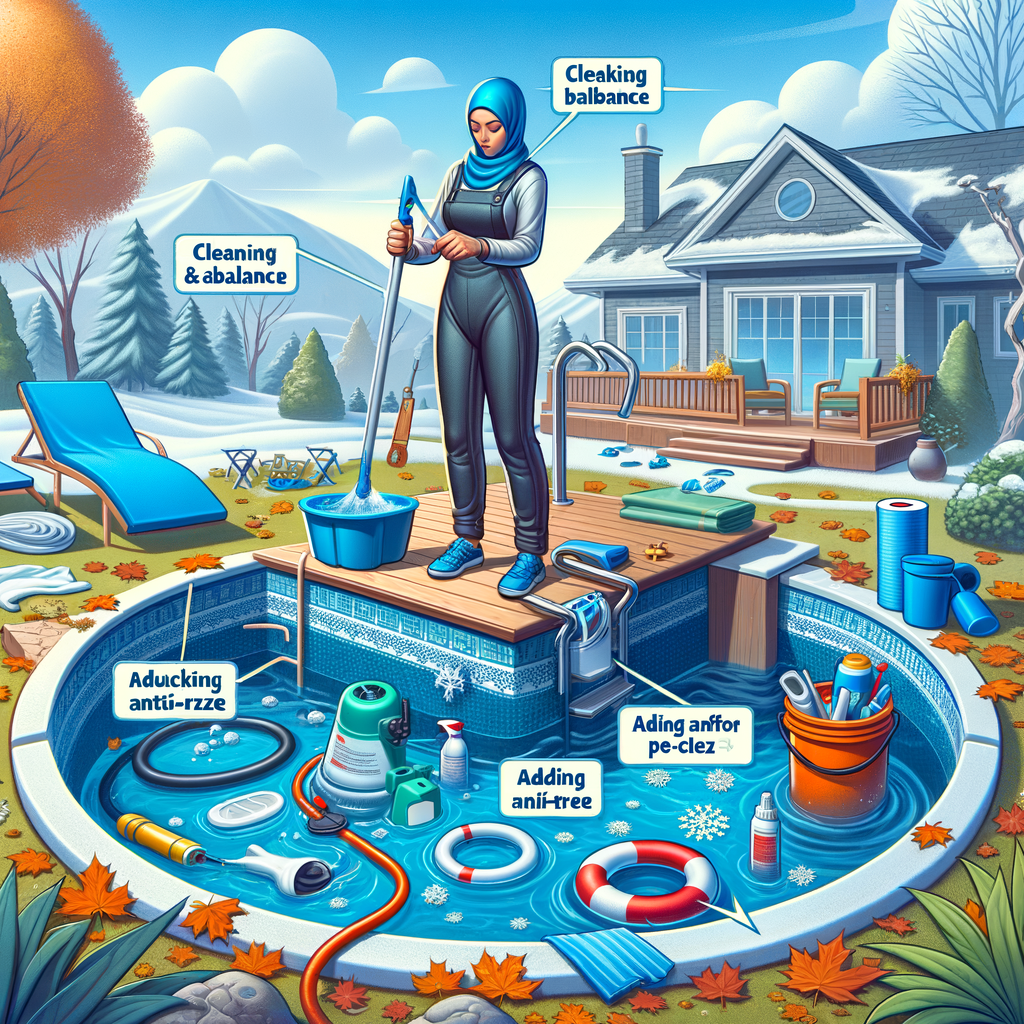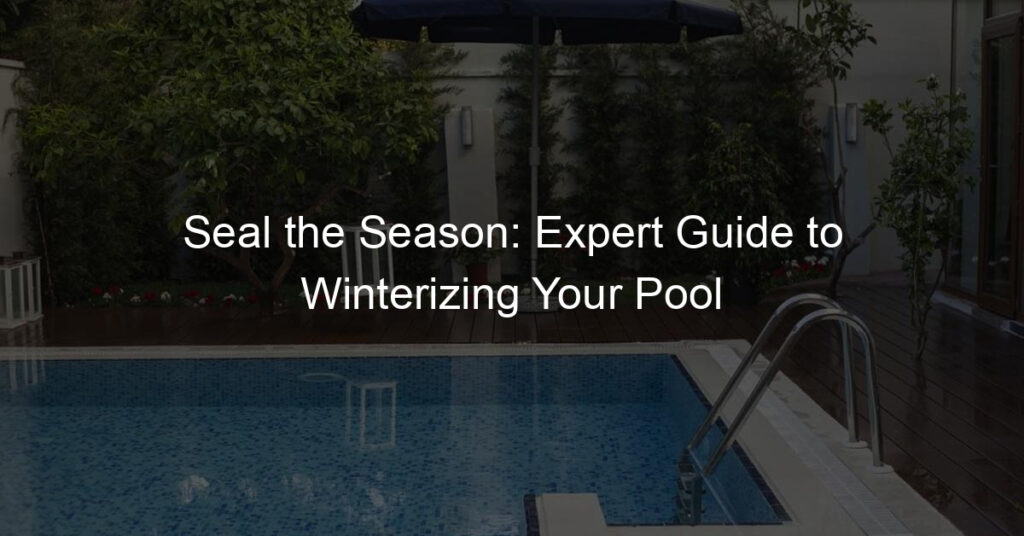
Introduction to Pool Winterization
As the cold season approaches, it’s essential to understand the importance of preparing your pool for winter. This process, known as pool winterization, is a crucial task for every pool owner. Let’s dive into the details and benefits of pool winterization.
- Understanding the importance of pool winterization
- Benefits of closing pool for winter
Pool winterization is more than just covering your pool when it’s not in use. It’s a comprehensive process that protects your pool from potential damage caused by freezing temperatures. When water freezes, it expands. This expansion can cause significant damage to your pool’s structure and plumbing system. By properly winterizing your pool, you can prevent costly repairs and ensure your pool is ready for use when the warm weather returns.
Winterizing your pool offers several benefits. First, it protects your pool from damage, saving you from potential high-cost repairs. Second, it keeps your pool clean, reducing the amount of work you’ll need to do when reopening it. Lastly, it can contribute to the longevity of your pool, ensuring you and your family can enjoy it for many years to come.
Now that you understand the importance and benefits of pool winterization, the next sections will provide expert advice on pool closing, a step-by-step guide on how to winterize your pool, and maintenance tips for winter pool care. Stay tuned for a case study on successful pool winterization and a conclusion on preparing your pool for winter.
Expert Advice on Pool Closing
As a pool owner, it’s crucial to understand the importance of properly closing your pool for the winter. This process, known as pool winterization, can help prevent damage to your pool and ensure it’s ready for use when the warmer weather returns. Let’s dive into some professional tips to help you with this task.
Professional Pool Winterization Tips
Here are some expert tips to help you effectively winterize your pool:
- Start early: Why timing matters in pool winterization
- Balance the water chemistry: The first step in pool closing procedures
- Cleaning: An essential part of preparing your pool for winter
Starting early is key in pool winterization. It’s best to start the process a week or two before you plan to close your pool. This allows ample time to adjust and balance the water chemistry, which can be a delicate process. Starting early also gives you a buffer in case of unexpected issues or delays.
Before you close your pool, it’s crucial to balance the water chemistry. This includes adjusting the pH, alkalinity, and calcium hardness levels. Properly balanced water can prevent corrosion and scale build-up, protecting your pool’s surfaces and equipment. It’s also important to shock the pool to kill bacteria and algae.
Cleaning your pool thoroughly is another vital step in pool winterization. This includes brushing the pool walls, vacuuming the pool floor, and cleaning the skimmer baskets and filters. A clean pool will be easier to open in the spring and less likely to have issues with algae or water quality.
By following these expert tips, you can ensure a smooth and successful pool closing process. Remember, proper pool winterization can save you time, money, and stress in the long run.
Common Mistakes in Pool Winterization
Winterizing your pool is a crucial task that ensures the longevity of your pool. However, many pool owners make common mistakes during this process. Let’s explore these errors to help you avoid them and ensure a smooth pool closing.
- Ignoring pool maintenance in winter
- Forgetting to cover the pool: The importance of pool covers in winter
One of the most common mistakes made by pool owners is neglecting pool maintenance during the winter months. Just because you’re not using your pool doesn’t mean it doesn’t need care. Winter is a time when your pool can be vulnerable to damage from freezing temperatures and harsh weather conditions. Regular checks for leaks, cracks, and water chemistry balance are essential during this time. Ignoring these tasks can lead to costly repairs and a shorter lifespan for your pool.
Another common mistake is forgetting to cover the pool. A pool cover is not just a safety measure, but it also plays a vital role in maintaining the condition of your pool during winter. The cover prevents debris from entering the pool, reduces the chance of water freezing, and helps maintain the water chemistry. Without a cover, your pool is exposed to the elements, which can lead to a host of problems, including algae growth and water contamination. Remember, a good quality pool cover is an investment that pays off in the long run by reducing maintenance costs and extending the life of your pool.
By avoiding these common mistakes, you can ensure that your pool remains in top condition throughout the winter and is ready for use when the warmer months arrive.
Step-by-Step Guide: How to Winterize Your Pool
As the cold season approaches, it’s essential to prepare your pool for the winter. This process, known as winterization, helps protect your pool from damage due to freezing temperatures and keeps it clean for the next swimming season. Here’s a simple, step-by-step guide to help you winterize your pool.
- Testing and Balancing Pool Water
- Cleaning the Pool and Filter
- Lowering the Water Level
- Winterizing the Pool Equipment
- Adding Winter Chemicals
- Covering the Pool for Winter
Before you start the winterization process, it’s crucial to test your pool water. You should check the pH, alkalinity, and calcium hardness levels. Ideally, the pH should be between 7.2 and 7.6, alkalinity between 80 and 120 parts per million (ppm), and calcium hardness between 180 and 220 ppm. Balancing your pool water helps prevent corrosion or scale buildup on your pool surfaces and equipment.
Next, thoroughly clean your pool and filter. Remove any leaves, dirt, or debris from the pool. Also, clean the pool filter to ensure it functions effectively. A clean pool and filter will make it easier to maintain the water balance and reduce the risk of algae growth during winter.
Lower the water level in your pool to prevent damage from freezing. The water level should be below the skimmer or pool return, but not too low that it exposes the pool liner to the elements. This step is crucial, especially in areas with severe winters.
Winterize your pool equipment, including the pump, filter, and heater. Drain water from the equipment to prevent freezing and potential damage. Also, disconnect the pump and filter, and store them in a dry, safe place. If you have a pool heater, it’s advisable to remove it and store it indoors.
Add winter chemicals to your pool to keep the water clean and clear. These chemicals include a winterizing algaecide and a pool enzyme product. The algaecide prevents algae growth, while the enzyme product breaks down non-living organic contamination.
Finally, cover your pool for the winter. A pool cover protects your pool from debris and reduces the risk of algae growth. It also helps to keep the water clean, making it easier to open your pool when the swimming season returns.
Winterizing your pool may seem like a daunting task, but with this step-by-step guide, you can do it with ease. Remember, a well-winterized pool will be easier to open in the spring, saving you time and money.
Winter Pool Care: Maintenance Tips
Winter can be a challenging time for pool owners. However, with the right maintenance tips, you can ensure your pool stays in top shape throughout the cold season. Here are some key strategies to keep in mind:
- Regularly checking the pool cover
- Keeping the pool area clean
- Monitoring the water level
One of the most important winter pool care tips is to regularly check your pool cover. This is your pool’s first line of defense against the harsh winter elements. Make sure it’s secure and free of damage. A good pool cover should be able to withstand the weight of snow and ice. If you notice any tears or holes, repair them immediately to prevent debris and excess water from getting into your pool.
Keeping the pool area clean is another crucial step in winter pool care. Remove any leaves, branches, or other debris from the pool area. These can damage your pool cover and make it less effective. Also, clean the pool deck and surrounding areas to prevent the growth of mold and mildew, which can cause damage over time.
During winter, it’s important to monitor your pool’s water level. If the water level gets too low, it can damage the pool’s structure and equipment. On the other hand, if the water level is too high, it can cause the pool cover to sag and collect debris. Check the water level at least once a week and adjust as necessary.
Remember, winter pool care is all about prevention. By regularly checking your pool cover, keeping the pool area clean, and monitoring the water level, you can prevent major problems and keep your pool in great shape for the warmer months ahead.
Key Takeaways
| Maintenance Tip | Why It’s Important |
|---|---|
| Regularly checking the pool cover | Prevents debris and excess water from getting into your pool |
| Keeping the pool area clean | Prevents damage to the pool cover and the growth of mold and mildew |
| Monitoring the water level | Prevents damage to the pool’s structure and equipment |
Case Study: Successful Pool Winterization
Let’s take a look at a real-life example of successful pool winterization. This case study will provide practical insights and tips that you can apply to your own pool closing process.
John’s Story: A DIY Success
John, a pool owner from New York, successfully winterized his pool last year. He was kind enough to share his approach, the challenges he faced, and the key takeaways from his experience.
- John’s approach to winterizing his pool
- Challenges faced and how they were overcome
- Key takeaways from John’s experience
John started by balancing the water chemistry about a week before closing his pool. He then cleaned the pool thoroughly, removing any debris. He lowered the water level below the skimmer and winterized the plumbing to prevent freezing. Finally, he covered the pool with a winter cover to keep out debris.
John faced a few challenges during the process. The biggest one was dealing with the pool’s plumbing. He was unsure how to winterize it properly to prevent freezing and potential damage. After researching and consulting with a pool professional, he learned the correct way to do it. He used a shop vac to blow out the lines, then plugged them to keep water out.
John’s experience taught him the importance of early preparation and thorough cleaning. He also learned that it’s okay to seek professional advice when unsure about a step in the process. His advice to other pool owners is to take the time to do it right, and not to rush the process.
John’s story is a testament to the fact that with the right approach and resources, anyone can successfully winterize their pool. The key is to start early, be thorough, and seek professional advice when needed.
Conclusion: Preparing Your Pool for Winter
As we wrap up our discussion on pool winterization, it’s crucial to remember that the process is not just about covering your pool and hoping for the best. It involves a series of steps that ensure your pool remains in perfect condition, ready for use when the warm weather returns.
- Recap of pool winterization tips
We’ve covered a lot of ground in this post, discussing everything from the importance of balancing your pool’s chemistry to the necessity of cleaning and covering your pool properly. Here’s a quick recap:
| Winterization Tips | Description |
|---|---|
| Balance Pool Chemistry | Ensures the water remains healthy and prevents damage to the pool. |
| Clean Your Pool | Removes debris and reduces the risk of algae growth. |
| Lower Water Level | Prevents water from freezing and causing damage. |
| Use a Pool Cover | Keeps out debris and helps maintain water chemistry. |
- The importance of professional pool winterization
While it’s possible to winterize your pool on your own, hiring a professional can save you time, effort, and potential mistakes. Professionals are equipped with the right tools and knowledge to ensure the process is done correctly, protecting your pool from potential winter damage.
- Final thoughts on winter pool care
Winter pool care is all about preparation and maintenance. By taking the right steps, you can ensure your pool stays in great shape throughout the winter months, ready to provide endless fun when summer rolls around again. Remember, a little effort now can save a lot of trouble later.
So, as the cold season approaches, don’t forget to winterize your pool. It’s an investment in your pool’s longevity and your future enjoyment.














